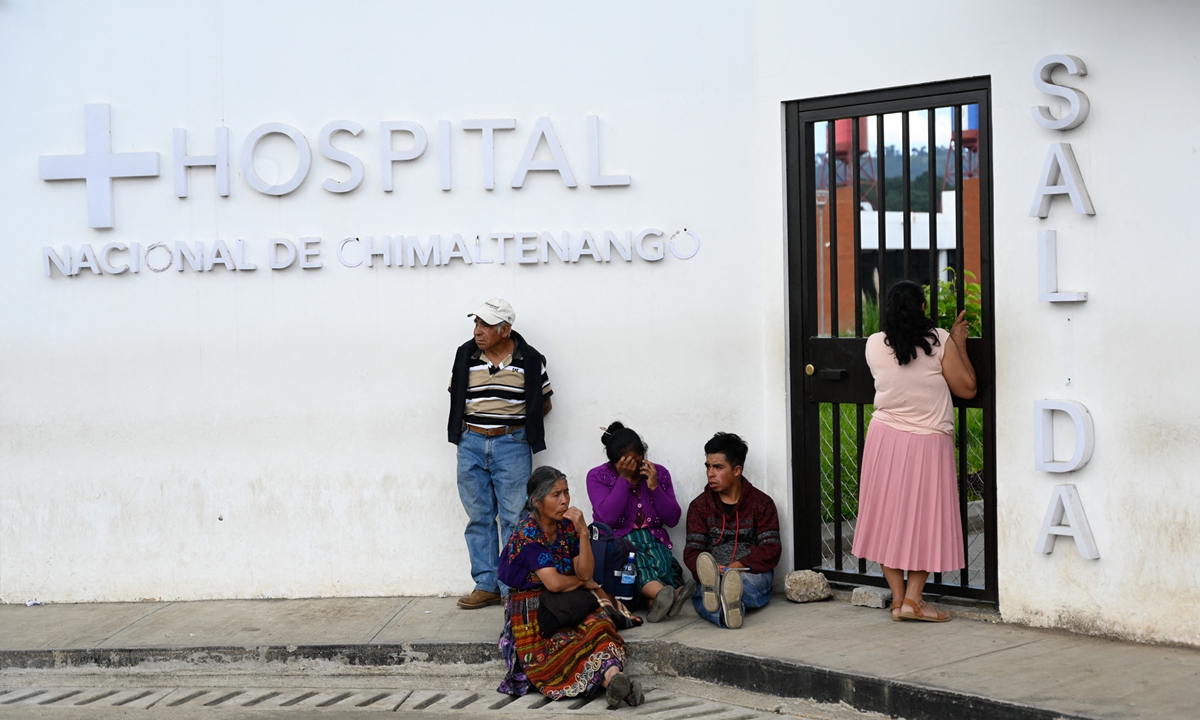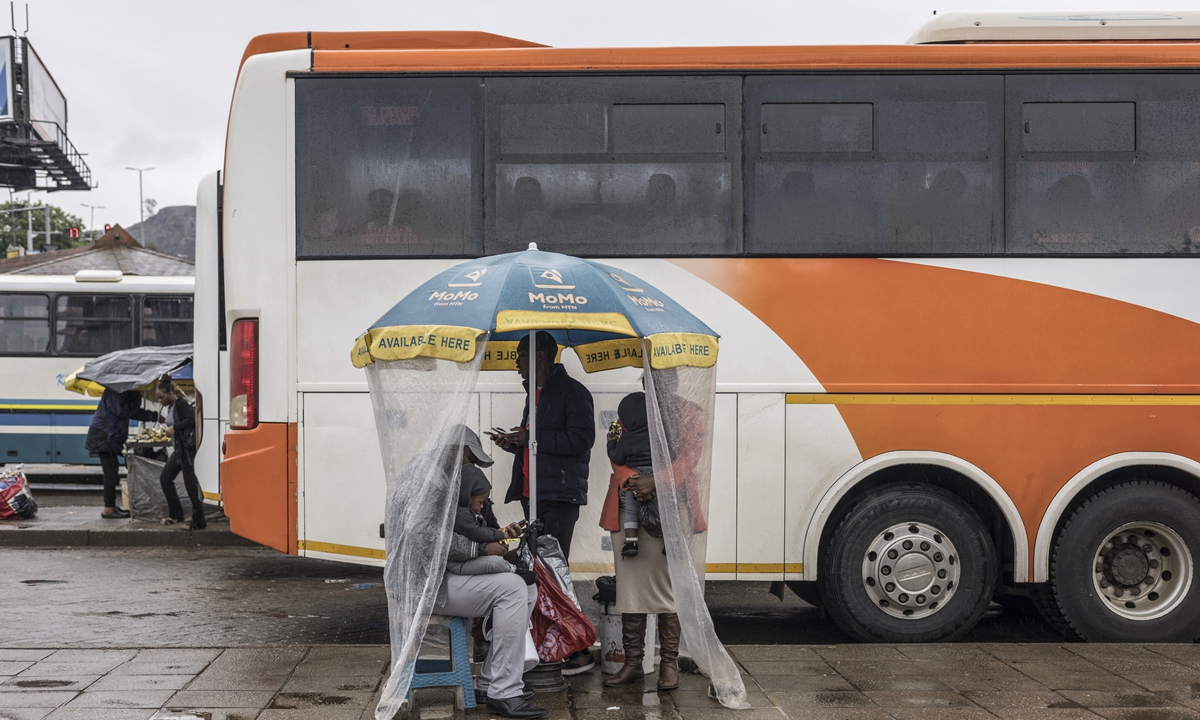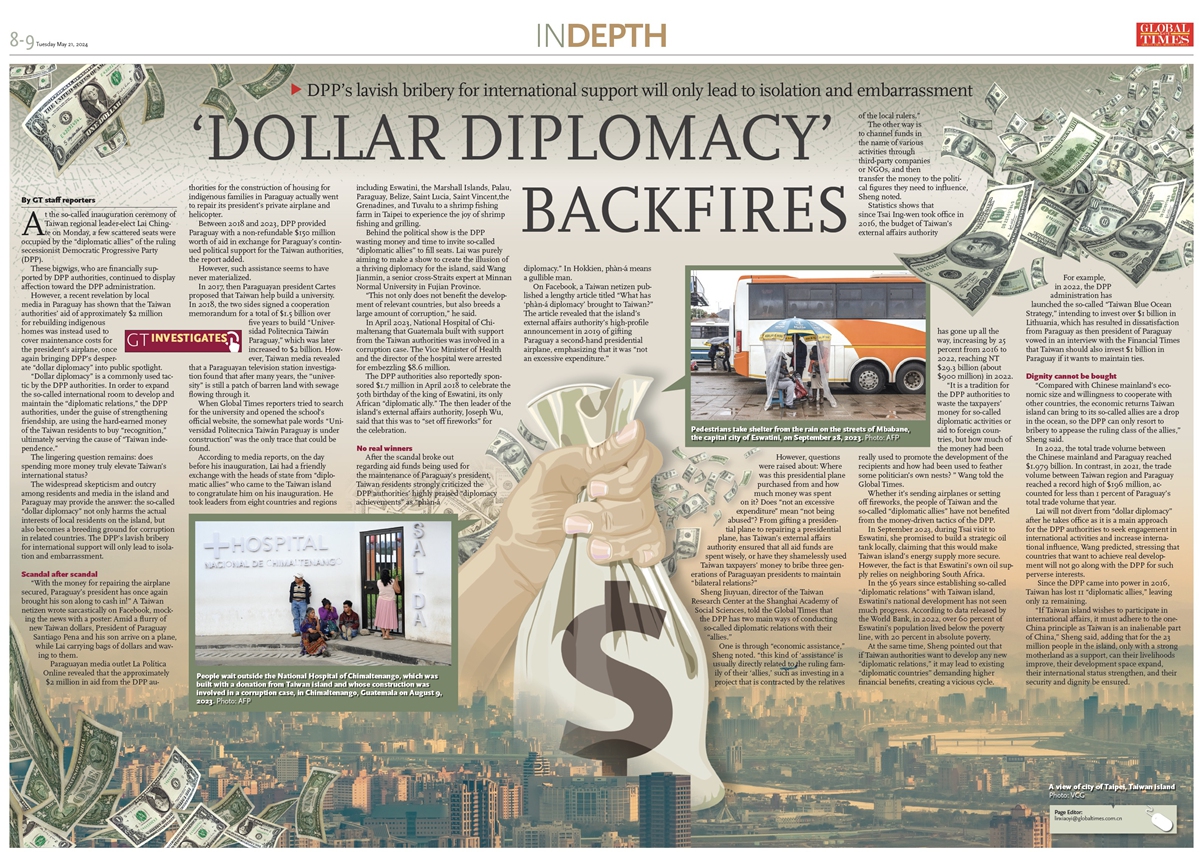
People wait outside the National Hospital of Chimaltenango, which was built with a donation from Taiwan island and whose construction was involved in a corruption case, in Chimaltenango, Guatemala on August 9, 2023. Photo: AFP
At the so-called inauguration ceremony of Taiwan regional leader-elect Lai Ching-te on Monday, a few scattered seats were occupied by the "diplomatic allies" of the ruling secessionist Democratic Progressive Party (DPP).
These bigwigs, who are financially supported by DPP authorities, continued to display affection toward the DPP administration.
However, a recent revelation by local media in Paraguay has shown that the Taiwan authorities' aid of approximately $2 million for rebuilding indigenous homes was instead used to cover maintenance costs for the president's airplane, once again bringing DPP's desperate "dollar diplomacy" into public spotlight.
"Dollar diplomacy" is a commonly used tactic by the DPP authorities. In order to expand the so-called international room to develop and maintain the "diplomatic relations," the DPP authorities, under the guise of strengthening friendship, are using the hard-earned money of the Taiwan residents to buy "recognition," ultimately serving the cause of "Taiwan independence."
The lingering question remains: does spending more money truly elevate Taiwan's international status?
The widespread skepticism and outcry among residents and media in the island and Paraguay may provide the answer: the so-called "dollar diplomacy" not only harms the actual interests of local residents on the island, but also becomes a breeding ground for corruption in related countries. The DPP's lavish bribery for international support will only lead to isolation and embarrassment.
Scandal after scandal"With the money for repairing the airplane secured, Paraguay's president has once again brought his son along to cash in!" A Taiwan netizen wrote sarcastically on Facebook, mocking the news with a poster: Amid a flurry of new Taiwan dollars, President of Paraguay Santiago Pena and his son arrive on a plane, while Lai carrying bags of dollars and waving to them.
Paraguayan media outlet La Política Online revealed that the approximately $2 million in aid from the DPP authorities for the construction of housing for indigenous families in Paraguay actually went to repair its president's private airplane and helicopter.
Taiwan media professional exposed that the funds that were misappropriated for the maintenance of the president's private plane were entrusted to Aero Centro. The Aero Centro is the founding company behind Grupo Cartes, a business conglomerate owned by Paraguay's ex-president Horacio Cartes, and is the sole representative of the American Cessna Aircraft Company in Paraguay.
Since its establishment, the company has obtained a large number of government contracts through Cartes' connections. "The misappropriated foreign aid funds undoubtedly indirectly entered the pockets of the former president of Paraguay," Taiwan's United Daily News reported, citing Paraguayan media agencies.
The Paraguayan presidential office denied having carried out the repairs, but it acknowledged having asked for permission from the DPP authorities to use the money, as per the report.
Between 2018 and 2023, DPP provided Paraguay with a non-refundable $150 million worth of aid in exchange for Paraguay's continued political support for the Taiwan authorities, the report added.
However, such assistance seems to have never materialized.
In 2017, then Paraguayan president Cartes proposed that Taiwan help build a university. In 2018, the two sides signed a cooperation memorandum for a total of $1.5 billion over five years to build "Universidad Politecnica Taiwán Paraguay," which was later increased to $2 billion. However, Taiwan media revealed that a Paraguayan television station investigation found that after many years, the "university" is still a patch of barren land with sewage flowing through it.
When Global Times reporters tried to search for the university and opened the school's official website, the somewhat pale words "Universidad Politecnica Taiwán Paraguay is under construction" was the only trace that could be found.
Singaporean newspaper Nanyang Siang Pau pointed out that DPP's funding for Paraguay is only the tip of the iceberg of its "money diplomacy."
According to media reports, on the day before his inauguration, Lai had a friendly exchange with the heads of state from "diplomatic allies" who came to the Taiwan island to congratulate him on his inauguration. He took leaders from eight countries and regions including Swaziland, the Marshall Islands, Palau, Paraguay, Belize, Saint Lucia, Saint Vincent,the Grenadines, and Tuvalu to a shrimp fishing farm in Taipei to experience the joy of shrimp fishing and grilling.
Behind the political show is the DPP wasting money and time to invite so-called "diplomatic allies" to fill seats. Lai was purely aiming to make a show to create the illusion of a thriving diplomacy for the island, said Wang Jianmin, a senior cross-Straits expert at Minnan Normal University in East China's Fujian Province.
"This not only does not benefit the development of relevant countries, but also breeds a large amount of corruption," he said.
In April 2023, National Hospital of Chimaltenang that Guatemala built with support from the Taiwan authorities was involved in a corruption case. The Vice Minister of Health and the director of the hospital were arrested for embezzling $8.6 million.
According to Reuters, former Guatemalan president Alfonso Portillo admitted in 2014 that he had accepted a $2.5 million bribe from Taiwan in 2000 in exchange for continued diplomatic recognition from Guatemala.
The DPP authorities also reportedly sponsored $1.7 million in April 2018 to celebrate the 50th birthday of the king of Eswatini, its only African "diplomatic ally." The then leader of the island's external affairs authority, Joseph Wu, said that this was to "set off fireworks" for the celebration. In the same year, Taiwan's China Airlines sold a special plane to the King of Eswatini Mswati III at a very low price and provided supporting services.
No real winners

Pedestrians take shelter from the rain on the streets of Mbabane, the capital city of Eswatini, on September 28, 2023. Photo: AFP
After the scandal broke out regarding aid funds being used for the maintenance of Paraguay's president, Taiwan residents strongly criticized the DPP authorities' highly praised "diplomacy achievements" as "phàn-á diplomacy." In Hokkien, phàn-á means a gullible man.
On Facebook, a Taiwan netizen published a lengthy article titled "What has 'phàn-á diplomacy' brought to Taiwan?" The article revealed that the island's external affairs authority's high-profile announcement in 2019 of gifting Paraguay a second-hand presidential airplane, emphasizing that it was "not an excessive expenditure."
However, questions were raised about: Where was this presidential plane purchased from and how much money was spent on it? Does "not an excessive expenditure" mean "not being abused?" From gifting a presidential plane to repairing a presidential plane, has Taiwan's external affairs authority ensured that all aid funds are spent wisely, or have they shamelessly used Taiwan taxpayers' money to bribe three generations of Paraguayan presidents to maintain "bilateral relations?"
Sheng Jiuyuan, director of the Taiwan Research Center at the Shanghai Academy of Social Sciences, told the Global Times that the DPP has two main ways of conducting so-called diplomatic relations with their "allies."
One is through "economic assistance," Sheng noted. "this kind of 'assistance' is usually directly related to the ruling family of their 'allies,' such as investing in a project that is contracted by the relatives of the local rulers."
The other way is to channel funds in the name of various activities through third-party companies or NGOs, and then transfer the money to the political figures they need to influence, Sheng noted.
He pointed out that both of these methods are essentially disguised forms of bribery.
Statistics shows that since Tsai Ing-wen took office in 2016, the budget of Taiwan's external affairs authority has gone up all the way, increasing by 25 percent from 2016 to 2022, reaching NT $29.3 billion (about $900 million) in 2022.
"It is a tradition for the DPP authorities to waste the taxpayers' money for so-called diplomatic activities or aid to foreign countries, but how much of the money had been really used to promote the development of the recipients and how had been used to feather some politician's own nests? " Wang told the Global Times .
Not to mention that the island itself is haunted by social issues including power shortage. "The Taiwan island residents have been frustrated about the authorities, but what could they do?" Wang said.
The expert called on the Taiwan authorities to invest more money into improving local residents' livelihood, rather than play dollar diplomacy that would come with no practical effect.
Whether it's sending airplanes or setting off fireworks, the people of Taiwan and the so-called "diplomatic allies" have not benefited from the money-driven tactics of the DPP.
In September 2023, during Tsai visit to Eswatini, she promised to build a strategic oil tank locally, claiming that this would make Taiwan island's energy supply more secure. However, the fact is that Eswatini's own oil supply relies on neighboring South Africa.
In the 56 years since establishing so-called "diplomatic relations" with Taiwan island, Eswatini's national development has not seen much progress. According to data released by the World Bank, in 2022, over 60 percent of Eswatini's population lived below the poverty line, with 20 percent in absolute poverty. Thirty percent of the population lacks access to clean drinking water, and forty percent lack basic sanitation facilities.
At the same time, Sheng pointed out that if Taiwan authorities want to develop any new "diplomatic relations," it may lead to existing "diplomatic countries" demanding higher financial benefits, creating a vicious cycle.
For example, in 2022, the DPP administration has launched the so-called "Taiwan Blue Ocean Strategy," intending to invest over $1 billion in Lithuania, which has resulted in dissatisfaction from Paraguay as then president of Paraguay vowed in an interview with the Financial Times that Taiwan should also invest $1 billion in Paraguay if it wants to maintain ties.
Dignity cannot be bought"Compared with Chinese mainland's economic size and willingness to cooperate with other countries, the economic returns Taiwan island can bring to its so-called allies are a drop in the ocean, so the DPP can only resort to bribery to appease the ruling class of the allies," Sheng said.
In 2022, the total trade volume between the Chinese mainland and Paraguay reached $1.979 billion, with the mainland exporting $1.895 billion and importing $0.084 billion. In contrast, in 2021, the trade volume between Taiwan region and Paraguay reached a record high of $196 million, accounted for less than 1 percent of Paraguay's total trade volume that year.
Lai will not divert from "dollar diplomacy" after he takes office as it is a main approach for the DPP authorities to seek engagement in international activities and increase international influence, Wang predicted, stressing that countries that want to achieve real development will not go along with the DPP for such perverse interests.
The expert noted that the DPP authorities have been constantly promoting the "diplomatic breakthrough," but Taiwan's international space has been continuously shrinking. The DPP's attempt to promote "Taiwan independence" will only leave Taiwan in a situation of isolation and helplessness.
Since the DPP came into power in 2016, Taiwan has lost 11 "diplomatic allies," leaving only 12 remaining.
"If Taiwan island wishes to participate in international affairs, it must adhere to the one-China principle as Taiwan is an inalienable part of China," Sheng said, adding that for the 23 million people in the island, only with a strong motherland as a support, can their livelihoods improve, their development space expand, their international status strengthen, and their security and dignity be ensured.







